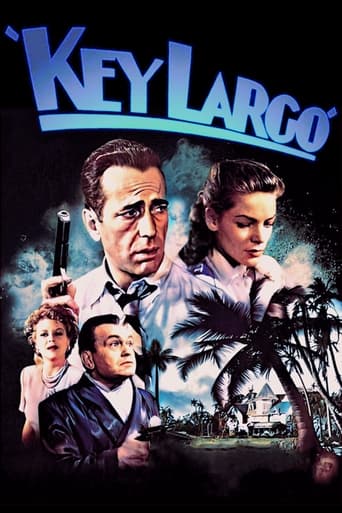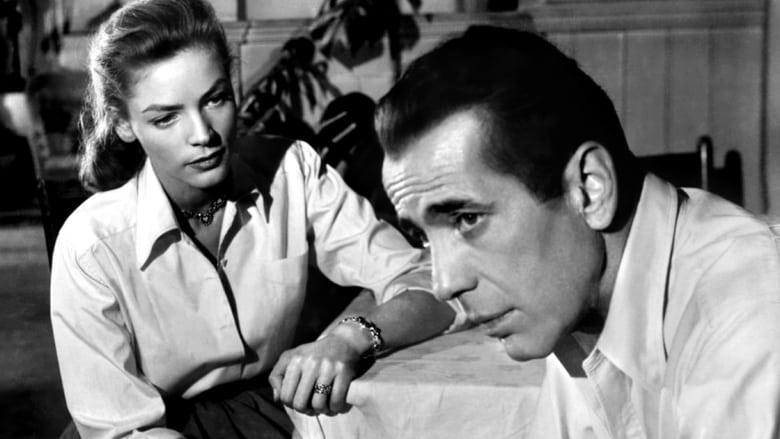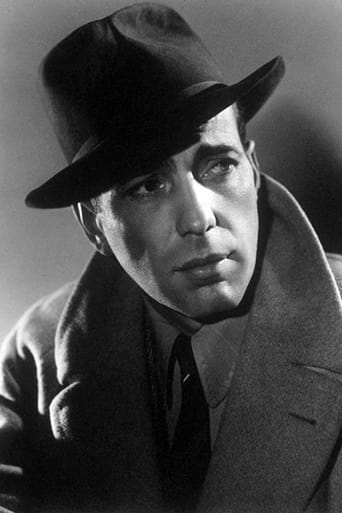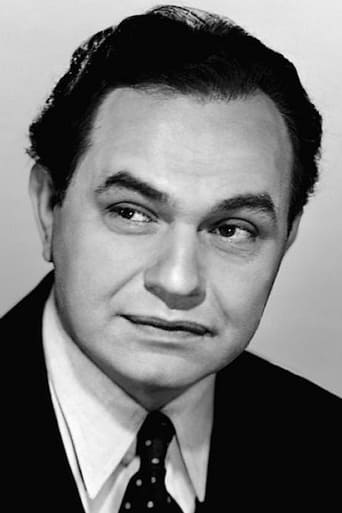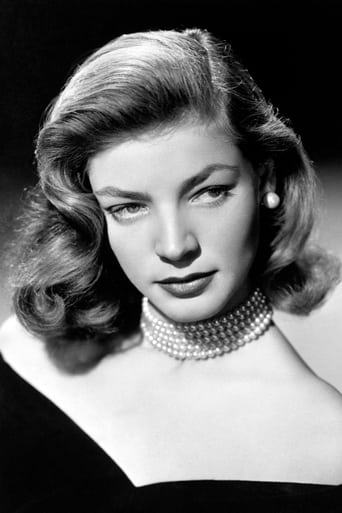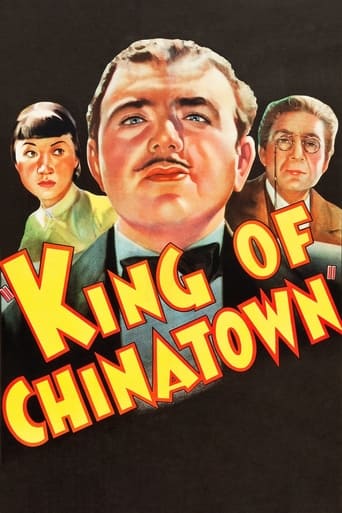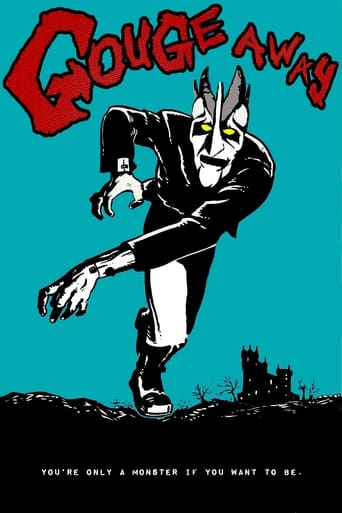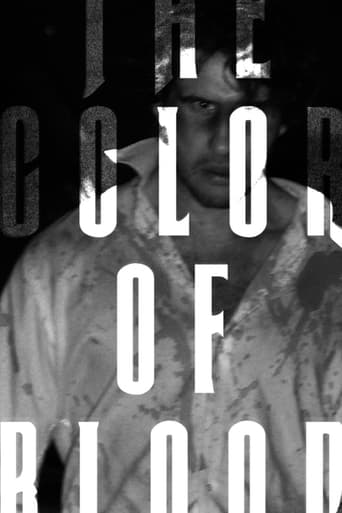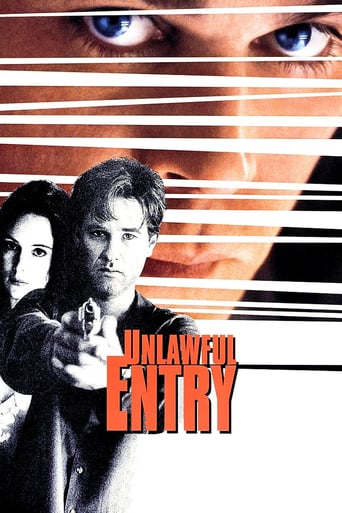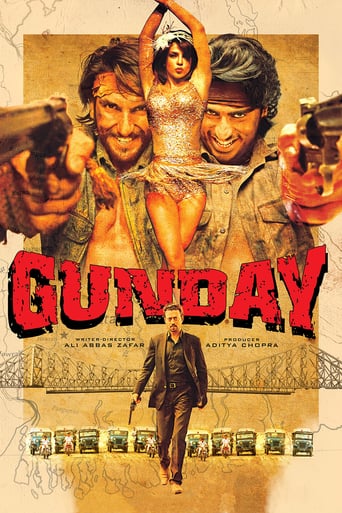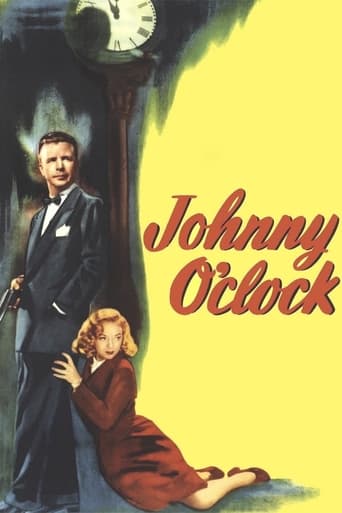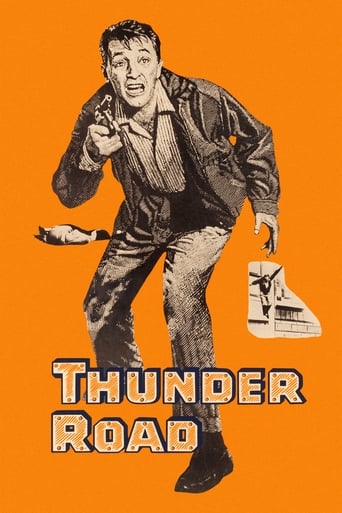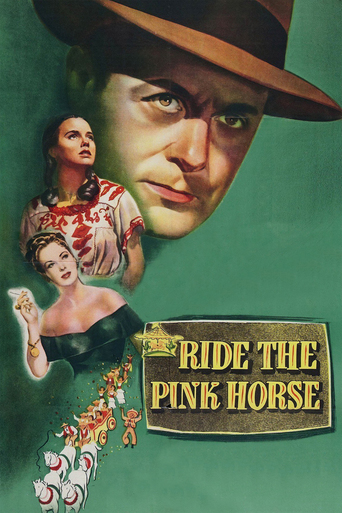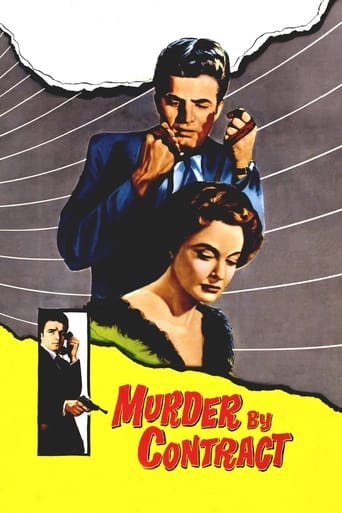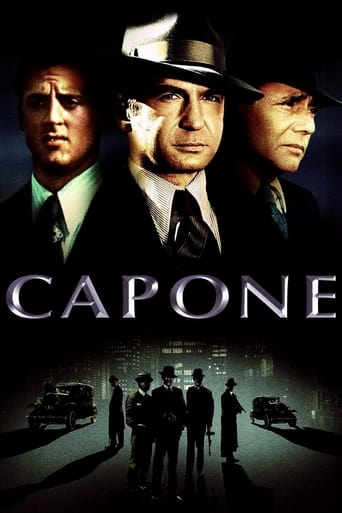Key Largo (1948)
A hurricane swells outside, but it's nothing compared to the storm within the hotel at Key Largo. There, sadistic mobster Johnny Rocco holes up - and holds at gunpoint hotel owner James Temple, his widowed daughter-in-law Nora, and ex-GI Frank McCloud.
Watch Trailer
Cast


Similar titles
Reviews
Set in the Key Largo Island, Key Largo places itself above its contemporaries as one of the definitive crime/gangster movies of the 1940's due to a superb cast, an excellent story, an unnerving setting and tense camera-work. John Huston holds the film together, allowing the characters, settings, and atmosphere to thrive on the screen.Johnny Rocco, played by Edward G. Robinson, remains one the most memorable gangsters to grace the screen, threatening but mortal. He knows there is such a thing as a fatal mistake, as he panics when a hurricane hits the resort, nearly ruining his deal with American associates. Yet even when the hurricane is hitting the resort, Rocco remains domineering and frightening, forcing his hostages to keep quiet when a sheriff visits with the threat of death, and even kills one that tries to escape. On the other side of the coin, Humphrey Bogart plays Frank McCloud, a World War II veteran and one of the hostages captured by Rocco. Unlike most heroic hostages in other movies, McCloud not only knows he's at a serious disadvantage, he subjects himself to that disadvantage and doesn't fight back, but waits. And waits. And waits until the end. In one of the movies tensest scenes, Rocco offers McCloud the chance to kill him. McCloud declines the chance, knowing he would be shot by Rocco's henchmen soon after. One of the other hostages takes the chance, and is promptly shot by Rocco. Rocco quickly reveals the gun he offered McCloud had no bullets, thus being a complete waste and instant death. McCloud proves himself as the standout hostage because of his common sense and his stoicism, barely flinching when Rocco threatens him.Other notable mentions in the cast include Lionel Barrymore as James Temple, the hotel owner who despises Rocco; Lauren Bacall as Nora Temple, the widow of a veteran whom McCloud knew; and Claire Trevor ended up winning the Academy Award for Best Supporting Actress for her portrayal as Gaye Dawn, a drunken singer and the moll of Rocco.The ending to Key Largo seals the movie's reputation, finally allowing McCloud to take his revenge on Rocco and his henchmen, thus giving him his freedom. The ending shootout remains one of film's more memorable, handled with care yet as tense and surprising as the scenes inside the hotel. With its superb cast and tense atmosphere, Key Largo remains one of the definitive gangster films of the 1940's.
People often criticize this movie for really not being much more than a filmed play. Yeah! So what's wrong with that when the characters are three dimensional and the actors are brilliant. This movie gets dull only when it moves out of the hotel (the stage) and becomes a traditional action movie. The black and white photography is brilliant (I once saw it colorized and it was dreadful). The production design is perfectly honest. The direction is so clear and unpretentious; when you have faces as brilliant as these, you gotta take advantage of closeups. There is not one less than outstanding performance. Bacall's role doesn't call for her to do a lot of "acting" and as a result, she is very moving. Trevor had tough competition for her Oscar that year and she won because she understood that too much restraint would have been wrong yet she never goes too far. Bsrrymore is unusually tough and commanding, almost heroic against the thugs. Bogart is quiet and direct and when he gives Trevor her drink has the most powerful moment in the movie. Robinson? It is a real showy role, and Edward knew what not to do. He is savage. And he almost is sexy when he gets Claire to sing her song but he can revert to a monster within seconds and give the audience chills. It really is his movie. Gomez and his fellow stupid thugs are funny at times but the script is unusually honest and barbaric. Take away their guns and these guys are wimps. But why didn't they just stay in the hotel? The shootout at the end could have been done that way. The escape to Cuba isn't believable or compelling. Those who call this movie slow, just don't get it. They don't understand that artists use pacing for effect. Today's generation loving special effects and action and over-the-top acting will hate this movie. Their loss. And the loss for the future of film and theatre.
I often feel like I don't fully understand these kinds of movies. Old ones basically, where there's lots of talking. Ways of life have changed so much. I don't get all of the social cues that are going on. I have no idea what the subtext of all the dialogue is. And yet, I've gotten used to certain patterns over time. I can tell when something's about to go down or if a character's lying or pushing buttons. Still, words aren't needed for certain facial expressions, you can immediately tell what someone is feeling or thinking.Most of this movie takes place in a hotel. Something comes up and some gangsters are forced to reveal themselves and take the guests and owners as hostages. They don't want any trouble. But then a hurricane comes and things get more complicated. Nobody can leave, at least for a while. Maybe someone will try to be a hero or talk smart. The tension builds.Johnny Rocco is a famous gangster (based on Al Capone and Lucky Luciano) who all the regular people despise. So much so that some of them can't keep it to themselves in spite of the harm it might bring to them. Edward G. Robinson really gets into the role alternating between brutal coldness and smarmy talking. He's confident but Frank McCloud (Humphrey Bogart) begins to see weaknesses, giving him some leverage. Frank talks logic, he thinks ahead and explains things.Key Largo seems to have a bit of a theme about war veterans in contrast with gangsters, these two extremes of Americans. The really noble, brave kind Vs. the heartless, selfish, evil kind. Frank (like every Bogart character) announces that he only cares about his own business and it seems true. But even he has to morally conclude that stopping someone like Rocco by any means could only be a good thing. This means he's willing to take some risks to harm Rocco which puts himself and the others in danger. I think there's a bit more emotion here from Bogart than usual. He even smiles a couple of times.The finale was pretty riveting and satisfying. It's always good when you're actually rooting for the good guys and you want the bad guys dead (because they're that bad). And you're on the edge of your seat because you hope things turn out well but know that anything could happen. It shows that you believe in and care about the characters. Well, what a turbulent experience for all of them!
Released in 1948, John Huston's "Key Largo" is a Post-War movie. Obviously. In this suffocating behind-closed-doors thriller, the moral relics of the War sweats out the characters' pores, with the obligatory evil : Johnny Rocco, played by an exquisitely confident Edward G. Robinson, and a self-doubting good side incarnated by a former WW2 veteran: Bogart as Frank McCloud, Lionel Barrymore as the father of his ill-fated Army buddy George, and as Nora, the precocious widow, Lauren Bacall in her fourth and final co-starring with her legendary husband.Swinging between, there's Oscar-winning Clair Trevor as Rocco's moll, Gaye Dawn, desperately seeking for a last drop of alcohol, how much she drinks says a lot about the wounded past she has to conceal, something Frank, the only one to give him a drink, can relate to. A former idealist probably, Frank had to fight with the assurance that his death would have a meaning: clearing the world of its poisoning vileness and barbarity. Yet Rocco stands for everything Frank fought against and is very much alive and cynically proud of his achievement.Men like Rocco highlight the pointlessness of George's death and that's what the Film-Noir genre is about, disillusion, the same after the victory's euphoria was toned down by the uncertainty of the world's fate, at the dawn of the Atomic Age. Who could put his faith in human nature after that? "Key Largo" is one of the most quintessential film-noir. War is the prominent shadow of Frank's past and the light of hope is this visit to Florida, an escape from the pessimism inherited from the past and the certitude that George's death was the ransom for a better world, seeking the real Post-war peace, peace of mind, but the light at the end of the tunnel might be of a passing train, a train named Johnny Rocco who'd confront Frank to the very demons he's escaping from.And in the pivotal moment when Rocco dared Frank to shoot him, Frank chose to drop his gun. There would be plenty of Roccos to take his place anyway, like the War didn't deprive the world from scum or evil. For long as there will be men, there will be wicked ones, so why should the good ones die to leave room for them? That dilemma is perfectly captured by Gaye Dawn's line "Better to live a coward or die a hero", which in Frank's mind resonates as, "calculated weakness can be more resourceful than pointless bravery". There's no point in heroism if it's deemed to fail, it's as meaningless as being called a coward.If not a hero, Frank is an existential character, because his life is worthier than his cause, if only to better serve the cause. It's not the action that counts, it's the one you do according to your personal beliefs. Basically, Frank's self-preservation commanded him not to waste his life for Rocco or for the sake of peer pressure. And who could ever think of him as a coward? Whether for giving a drink, taking a few slaps (and what slaps!) and shielding Nora, Frank never acted brave, he was brave ... something he might've learned from the War, like Patton said "you don't win a war by dying for a country, but by making the other bastard die".George might've been a hero, but it was Frank smelling Florida coolest breezes and toying with Nora's beautiful hair. Life isn't an act, it's reality and reality commands to accept some bits of failure, the quintessential Hustonian theme. All Huston movies are about characters who try to escape from their inner condition but fail because they're essentially tragic. Rocco's success was Frank's failure, the living incarnation of his bitterness and anger toward the world. But being a failure is one thing but no Hustonian character is a loser, the relative quietness of Frank is only the silence before the storm, after the real one would be over.Indeed, Frank knew that he had to fight no matter what, postponing the time of the confrontation wouldn't avoid it and it's only after Rocco kills the innocent Indians (Sawyer took a chance and wasn't a 'civilian') that Frank makes up his mind. He knows killing Rocco won't change anything, but not killing him would leave a much more indelible stain in his soul. He had to act, that was his destiny as a fighter, a soldier, a man of morality who wouldn't let the killing of the two innocents get unpunished. An existential character gives a meaning to his acts, but paradoxically, believes that he's got but one destiny. He chooses what to do but most times, there's only one thing to do.And the climax conveys the fascinating paradox. Frank, now dispassionate, cold and methodical, eliminates the bad guys one by one, killing the last demon who'd ever have to torture his soul. This is the light of excitement that ignite Bogie's eyes while staring at that door from the boat's rooftop before Rocco would show his face for a last time. He knows he's going to accomplish himself once and for all and really escape from his tormented past. Escapism is another symbolic device in Huston's oeuvre, full of people trying to transcend their own condition yet their quest for freedom or success lead them to a physical or moral entrapment.There's something of Fred C. Dobbs in Frank McCloud, something of The "Night of the Iguana" in "Key Largo", people isolated and entrapped to give the word 'escape' its fullest meaning. Frank wouldn't find peace in Florida but also the peace of this soul. A hurricane is ravaging the outside, but the climate is even more dangerous in the inside. It's escapism as the quest for any trapped soul and entrapment for any soul trying to escape its condition, you've got to earn it, whether you lose or fail. "Key Largo" was Frank's key to his own salvation.

